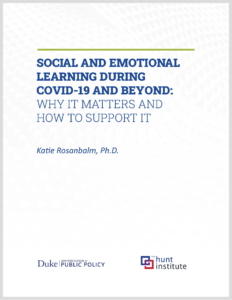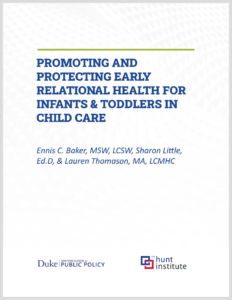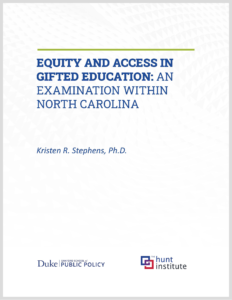Duke Research Fellow Papers Explore Issues Across the Education Continuum
February 12, 2021
This week, The Hunt Institute released research papers from our three fall 2020 Duke University Sanford School of Public Policy Research Fellows. The papers highlight social-emotional learning, equity in gifted education programs, and relationship-building between caregivers and young learners in early child care settings. We’ve summarized and provided links to the papers below.
Social Emotional Learning During COVID-19 and Beyond: Why it Matters and How to Support It
Katie Rosanbalm, Ph.D.
During the pandemic, social emotional learning (SEL) has become a buzzword. In her paper, Dr. Rosanbalm breaks down SEL – what it is, why it’s important now, and best practices  for the classroom. By becoming socially and emotionally competent, children can better recognize and manage their emotions, follow directions, and set goals. Although SEL has always been an important aspect of K-12 education, it’s become especially important during the pandemic. For many children, remote learning has led to uncertainty, anxiety, and depression. The skills gained from SEL may help them cope and remain resilient in trying times. Dr. Rosanbalm argues that SEL can be a universal core instruction in schools, and lends itself to a positive school culture focused on the well-being of students. SEL has achieved bipartisan support – 20 states have already adopted SEL standards, with equivalent adoption rates by Democrat- and Republican-led states.
for the classroom. By becoming socially and emotionally competent, children can better recognize and manage their emotions, follow directions, and set goals. Although SEL has always been an important aspect of K-12 education, it’s become especially important during the pandemic. For many children, remote learning has led to uncertainty, anxiety, and depression. The skills gained from SEL may help them cope and remain resilient in trying times. Dr. Rosanbalm argues that SEL can be a universal core instruction in schools, and lends itself to a positive school culture focused on the well-being of students. SEL has achieved bipartisan support – 20 states have already adopted SEL standards, with equivalent adoption rates by Democrat- and Republican-led states.
Promoting and Protecting Early Relational Health for Infants and Toddlers in Child Care
Ennis C. Baker, MSW, LCSW; Sharon Little, Ed., Lauren Thomason, MA, LCMHC
Even before the pandemic, child care staff worked long hours for low pay and few benefits. Some infants  and toddlers are in the classroom for upwards of 50 hours a week. With all of this time in the classroom during the first few years of life, it is vital for children to build nurturing, responsive relationships with their caregivers. Responsive relationships are an important factor in mitigating stress in children, but it takes the right environment for these relationships to form. Baker argues that state and federal policies must work toward improving the physical and mental health of the child care workforce. Only when staff feel healthy and safe can they properly focus on building strong, responsive relationships with children. When caregivers are under less stress, they can better address the needs of children, in turn, reducing young learners’ levels of stress.
and toddlers are in the classroom for upwards of 50 hours a week. With all of this time in the classroom during the first few years of life, it is vital for children to build nurturing, responsive relationships with their caregivers. Responsive relationships are an important factor in mitigating stress in children, but it takes the right environment for these relationships to form. Baker argues that state and federal policies must work toward improving the physical and mental health of the child care workforce. Only when staff feel healthy and safe can they properly focus on building strong, responsive relationships with children. When caregivers are under less stress, they can better address the needs of children, in turn, reducing young learners’ levels of stress.
Equity and Access in Gifted Education: An Examination within North Carolina
Kristen R. Stephens, Ph.D.
Despite attempts over the years to lessen the racial disparities in gifted education, Black and Latino students continue to be underrepresented in North Carolina gifted programs. In 2019, a report by WestEd, Learning Policy Institute, and The Friday Institute for Educational Innovation found that students in low-poverty schools had access to gifted education programs at five times the rate compared to students in high-poverty schools. Every Local Education Agency (LEA) has autonomy regarding policies and practices for identifying and serving students, which is part of the reason for the disparities. Across the state, Black, Hispanic, Native American, and Pacific Islander students range from underrepresented to substantially underrepresented. To include a greater diversity of students in programs, Dr. Stephens argues that policymakers must first be made aware that there is a representation issue. When states and districts understand the issue, they can begin work to equitably identify gifted students and allow them to receive services.
Learning Policy Institute, and The Friday Institute for Educational Innovation found that students in low-poverty schools had access to gifted education programs at five times the rate compared to students in high-poverty schools. Every Local Education Agency (LEA) has autonomy regarding policies and practices for identifying and serving students, which is part of the reason for the disparities. Across the state, Black, Hispanic, Native American, and Pacific Islander students range from underrepresented to substantially underrepresented. To include a greater diversity of students in programs, Dr. Stephens argues that policymakers must first be made aware that there is a representation issue. When states and districts understand the issue, they can begin work to equitably identify gifted students and allow them to receive services.


